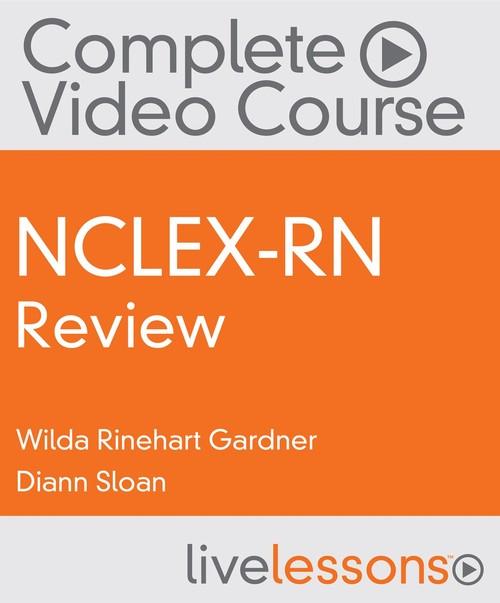Oreilly - NCLEX-RN Review Complete Video Course
by Wilda Rinehart / Diann Sloan | Publisher: Pearson IT Certification | Release Date: May 2015 | ISBN: 9780134034997
10+ Hours of Video InstructionOverviewNCLEX-RN Review Complete Video Course is an engaging self-paced video training solution that provides learners with more than 11 hours of personal, visual instruction from expert trainers who have more than 26 years of practical teaching experience. Through the use of topic-focused instructional videos, you will gain an in depth understanding of the NCLEX-RN exam and what you need to know to pass the exam and gain your nursing license.Included with the product are dynamic and interactive hands-on exercises and quizzes, so you can test your knowledge while you study. The course also includes a practice exam, which is based on the NCLEX-RN Test Plan.Description The NCLEX-RN Review Complete Video Course provides more than 11 hours of concise coverage of all the topics a candidate needs to study for the registered nurse licensing exam. It blends the ideal level of discussion, drawings, tables, and case studies into an easily digestible format for study. The NCLEX-RN exam is not a comprehensive recall of clinical nursing facts, but rather a test of critical judgment and management skills. The RN exam has more questions than the PN exam, varying between 75 and 265 questions. It is a more in depth exam in regards to management-level skills than the PN exam. It is a Computer Adaptive Test (CAT) in which each test is assembled interactively based on the candidate's response to previous questions. The authors give students tips for passing the exam from using memory devices to understanding question structure to practice with alternative item style questions.This Complete Video Course also includes interactive hands-on exercises available on the course's streaming site to help you further study for the exam. Section quizzes, glossary quizzes, and a practice final exam are also presented through the course's interactive site, so you have all the material needed to prepare for the exam.About the InstructorsWilda Rinehart Gardner received an Associate Degree in Nursing from Northeast Mississippi Community College in Booneville, Mississippi. After working as a staff nurse and charge nurse, she became a public health nurse and served in that capacity for a number of years. In 1975, she received her nurse practitioner certification in the area of obstetrics-gynecology from the University of Mississippi Medical Center in Jackson, Mississippi. In 1979, she completed her Bachelor of Science degree in Nursing from Mississippi University for Women. In 1980, she completed her Master of Science degree in Nursing from the same university and accepted a faculty position at Northeast Mississippi Community College, where she taught medical-surgical nursing and maternal-newborn nursing. In 1982, she founded Rinehart and Associates Nursing Consultants. For the past 26 years, she and her associates have worked with nursing graduates and schools of nursing to assist graduates to pass the National Council Licensure Exam for Nursing. She has also worked as a curriculum consultant with faculty to improve test construction. Ms. Gardner has served as a convention speaker throughout the southeastern United States and as a reviewer of medical-surgical and obstetric texts. She has co-authored materials used in seminars presented by Rinehart and Associates Nursing Review. As the president of Rinehart and Associates, she serves as the coordinator of a company dedicated to improving the quality of health through nursing education.Dr. Diann Sloan received an Associate Degree in Nursing from Northeast Mississippi Community College, a Bachelor of Science degree in Nursing from the University of Mississippi, and a Master of Science degree in Nursing from Mississippi University for Women. In addition to her nursing degrees, she holds a Master of Science in Counseling Psychology from Georgia State University and a Doctor of Philosophy in Counselor Education, with minors in both Psychology and Educational Psychology from Mississippi State University. She has completed additional graduate studies in healthcare administration at Western New England College and the University of Mississippi. Dr. Sloan has taught pediatric nursing, psychiatric mental health nursing, and medical-surgical nursing in both associate degree and baccalaureate nursing programs. As a member of Rinehart and Associates Nursing Review, Dr. Sloan has conducted test construction workshops for faculty and nursing review seminars for both registered and practical nurse graduates. She has co-authored materials used in the item-writing workshops for nursing faculty and Rinehart and Associates Nursing Review. She is a member of Sigma Theta Tau nursing honor society.Skill Level Beginning to intermediateWho Should Take This Course Nursing students or working PNs studying for the NCLEX-RN license exam. In some cases, PN studies are the beginning of the RN studies, but this varies by state and school. It is possible to become a PN, and work as a PN, while continuing to study for the RN exam.Nursing students close to their graduation ready to begin their NCLEX exam studiesTable of ContentsIntroductionLesson 1: Testing Strategies for Success—How to Pass the NCLEXAs you prepare to take the National Councils Licensure Exam, you might feel overwhelmed and frustrated. There is so much material to review and so many decisions to make. During this lesson, we will discuss the development of the NCLEX, the NCLEX test plan, and the types of questions to expect when taking the exam. We will also discuss testing strategies that really work. These testing strategies help you to eliminate answers that are wrong and focus on the correct answers.Lesson 2: Simplifying PharmacologyFor a number of years I have searched for ways to help students understand and apply knowledge of pharmacology. We all know that a large part of the nurse's responsibility is the administration of medication and teaching the client and family about their medication. In this lesson, we will discuss simplifying the study of pharmacology by categorizing the medication by family, this will help you to remember the nursing implications and side effects and make answering those difficult pharmacology questions easy. Lesson 3: Caring for the Client with Respiratory DisordersAccording to the Centers for Disease Control, lung disease is one of the leading causes of death in persons 55 65 years of age living in the United States. It is estimated that more than 35 million Americans live with chronic lung disease. Some of these diseases, such as asbestosis, are the result of occupational exposure and carry associated risks of lung cancer. In this lesson, we will look at the acute life threatening disorders (ARDS and pulmonary embolus) as well as the common noninfectious disorders that contribute to chronic lung disease, infectious diseases of the lower respiratory tract, and emerging pulmonary infections.Lesson 4: Caring for the Client with Renal & GU Disorders Disorders of the genitourinary system include diseases and disorders that affect the urinary bladder, ureters, and kidneys as well as disorders of the prostate and testes. In this lesson, we will look at the most common renal and genitourinary disorders, including the treatment of acute and chronic renal failure.Lesson 5: Caring for the Client with Hematopoietic DisordersThe hematopoietic system consists of the blood, blood cells, and blood forming elements. The circulation of blood provides oxygen and nutrients to all body systems and the removal of cellular waste; therefore, a functioning hematological system is essential for life. Hematological disorders can be the result of a lack of function, a reduction in production, or an increase in the destruction of blood cells. In this lesson, we will review the most common hematopoietic disorders. The lessons on “Cancer” and “Caring for the Client with Hematopoietic Disorders” provide additional information on hematopoietic disorders such as leukemia.Lesson 6: ObstetricsPregnancy is a special time in a woman's life. In this discussion of pregnancy, we will include prenatal care, intrapartal care, postpartal care, and the neonatal client. We will also discuss abnormal obstetrics. And no discussion of women's health would be complete without a discussion of gynecological topics such as STIs and methods of birth control.Lesson 7: Caring for the Client with BurnsAlthough we seldom think of the skin as an organ, it is the largest and one of the most complex organs of the body. Composed of three layers, the skin performs several vital functions, including protection against infection, prevention of fluid and electrolyte imbalance, regulation of temperature, and activation of vitamin D. In this lesson, we will review the sources of burn injury and focus on the care of the client with major burns.Lesson 8: Caring for the Client with Disorders of the EyesMost of us will agree that the abilities to see, hear, taste, perceive touch, and smell are important. Without the ability to smell, food would have little, if any, taste. The sense of touch lets us know when we experience something pleasurable or are injured. But of all the senses, the abilities to see and hear are considered most important, because they keep us most informed about the world around us. Sensory disorders that affect sight and sound can be the result of aging, disease, or injury. In this lesson, we will review common problems affecting the sense of vision and interventions to correct or improve these disorders.Lesson 9: Caring for the Client with Disorders of the EarsMost of us will agree that the abilities to see, hear, taste, perceive touch, and smell are important. Without the ability to smell, food would have little, if any, taste. The sense of touch lets us know when we experience something pleasurable or are injured. But of all the senses, the abilities to see and hear are considered most important, because they keep us most informed about the world around us. Sensory disorders that affect sight and sound may be the result of aging, disease, or injury. In this lesson, we will review common problems affecting the sense of hearing and interventions to correct or improve these disorders.Lesson 10: CancerCancer ranks as the second leading cause of death in the United States. In this lesson, we will discuss the American Cancer's Warning Signs, the most common types of cancer, diagnostic studies used to detect cancers, and the treatment of cancers.Lesson 11: Caring for the Pediatric ClientThere are few areas in nursing more challenging or more rewarding than working with children and their families. The pediatric nurse combines the knowledge of disease process with an understanding of how illness and injury affect normal growth and development. In this lesson, we will review principles of normal growth and development and some of the most common disorders affecting children, as well as life-threatening conditions including childhood cancer.Lesson 12: Caring for the Client with Disorders of the Gastrointestinal SystemPrimary functions of the gastrointestinal system are the ingestion and digestion of food (mouth, esophagus, stomach, gallbladder, liver, and pancreas), extraction of nutrients (small intestine), and elimination of waste (large intestine). In addition to these functions, the liver serves as the “chemical treatment facility of the body” and plays a major role in coagulation. Problems in the gastrointestinal system can result in impaired function of the organs involved. In this lesson, we will review the most common gastrointestinal disorders, as well viral infections of the liver and problems associated with food borne illnesses. Lesson 13: Fluid & Electrolytes AnalysisAlthough fluid and electrolyte balance and acid-base balance are separate entities, they are directly related to one another. During this lesson, we will discuss variations in fluid and electrolytes and acid-base balance and how they can result in disease processes. We will also discuss the treatment of these alterations.Lesson 14: MusculoskeletalThe musculoskeletal system includes muscles, bones, and joints. Injury to the musculoskeletal system is one of the primary reasons for disability in the United States. Advancing age and weakened bones due to osteoporosis are major risk factors for factures. Musculoskeletal trauma can be minor requiring short term care, or major with long term or permanent disabilities. Connective tissue disorders, such as rheumatoid arthritis and lupus, not only affect the joints, but have systemic effects as well. In this lesson, we will discuss injuries and diseases that affect bones, joints, and connective tissue and the treatment of these disorders. Lesson 15: Caring for the Client with Endocrine DisordersThe endocrine system is comprised of glands distributed throughout the body. These glands secrete and regulate hormones. When there are alterations in the levels of hormones throughout the body, other organs suffer. In this lesson, we will discuss the function of the glands of the body, diagnostic studies, nutritional requirements, and the disease processes that occur when over or under production of hormones occur.Lesson 16: Caring for the Client with Cardiovascular System DisordersThe cardiovascular system comprises the heart and blood vessels and is responsible for the transport of oxygen and nutrients to the organ systems of the body. In this lesson, we will discuss alterations in the cardiovascular system, diagnostic studies used to determine alterations in normal function, and the treatments used to improve or correct these alterations.Lesson 17: Caring for the Client with Neurological System DisordersDisorders of the neurological system can be due to several causes, such as direct injuries to the brain and spinal cord, deficiencies of neurotransmitters, or impaired circulation and oxygenation associated with stroke or myocardial infarction. These disorders can be acute and life threatening or chronic with gradual deterioration. In this lesson, we will review common neurological disorders, spinal cord injury, and degenerative neurological disorders.Lesson 18: Caring for the Client with Psychiatric DisordersIn this lesson, we will review the most commonly diagnosed psychiatric-mental health disorders. This lesson covers anxiety-related disorders, personality disorders, the psychotic disorders of schizophrenia and bipolar disorder, substance abuse, and some of the disorders seen in childhood and adolescence.Lesson 19: Legalities & Wrap-UpSafe nursing practice requires knowledge of the practice and legal boundaries of the nurse. The state boards of nursing are responsible for ensuring that those licensed to practice nursing are safe practitioners and that they abide by standards of nursing practice. In this lesson, we will discuss the responsibilities of the licensed practical nurse, the registered nurse, and the unlicensed assistive personal. We will also review material previously discussed on the topic of the NCLEX and testing strategies. Following a review of these topics, we will practice taking questions written in the NCLEX format and finally wrap up our course with a discussion of preparation for the NCLEX with some final words of wisdom.SummaryAbout LiveLessons Video Training LiveLessons Video Training series publishes hundreds of hands-on, expert-led video tutorials covering a wide selection of technology topics designed to teach you the skills you need to succeed. This professional and personal technology video series features world-leading author instructors published by your trusted technology brands: Addison-Wesley, Cisco Press, IBM Press, Pearson IT Certification, Prentice Hall, Sams, and Que. Topics include: IT Certification, Programming, Web Development, Mobile Development, Home and Office Technologies, Business and Management, and more. View all LiveLessons on InformIT at: http://www.pearsonitcertification.com/livelessons
- Introduction
- NCLEX-RN Review, Complete Video Course: Introduction, by Wilda Rinehart 00:00:57
- NCLEX-RN Review, Complete Video Course: Introduction, by Diann Sloan 00:00:44
- Lesson 1: Testing Strategies for Success - How to Pass the NCLEX
- Learning Objectives 00:00:48
- Testing Strategies for Success - How to Pass the NCLEX 00:38:40
- Lesson 2: Simplifying Pharmacology
- Learning Objectives 00:00:47
- Simplifying Pharmacology 00:55:48
- Lesson 3: Caring for the Client with Respiratory Disorders
- Learning Objectives 00:01:19
- Caring for the Client with Respiratory Disorders 00:36:51
- Lesson 4: Caring for the Client with Renal & GU Disorders
- Learning Objectives 00:00:41
- Caring for the Client with Renal & GU Disorders 00:34:50
- Lesson 5: Caring for the Client with Hematopoietic Disorders
- Learning Objectives 00:00:51
- Caring for the Client with Hematopoietic Disorders 00:16:27
- Lesson 6: Obstetrics
- Learning Objectives 00:00:42
- Obstetrics 1:01:48
- Lesson 7: Caring for the Client with Burns
- Learning Objectives 00:00:42
- Caring for the Client with Burns 00:16:33
- Lesson 8: Caring for the Client with Disorders of the Eyes
- Learning Objectives 00:00:49
- Caring for the Client with Disorders of the Eyes 00:17:01
- Lesson 9: Caring for the Client with Disorders of the Ears
- Learning Objectives 00:00:49
- Caring for the Client with Disorders of the Ears 00:10:17
- Lesson 10: Caring for the Client with Cancer
- Learning Objectives 00:00:30
- Caring for the Client with Cancer 00:35:46
- Lesson 11: Caring for the Pediatric Client
- Learning Objectives 00:00:41
- Caring for the Pediatric Client 00:41:03
- Lesson 12: Caring for the Client with Disorders of the Gastrointestinal System
- Learning Objectives 00:00:54
- Caring for the Client with Disorders of the Gastrointestinal System 00:29:07
- Lesson 13: Fluid and Electrolytes Analysis
- Learning Objectives 00:00:32
- Fluid and Electrolytes Analysis 00:34:32
- Lesson 14: Musculoskeletal
- Learning Objectives 00:01:06
- Musculoskeletal 00:41:08
- Lesson 15: Caring for the Client with Endocrine Disorders
- Learning Objectives 00:00:43
- Caring for the Client with Endocrine Disorders 00:49:59
- Lesson 16: Caring for the Client with Disorders of the Cardiovascular System
- Learning Objectives 00:00:35
- Caring for the Client with Disorders of the Cardiovascular System 00:57:33
- Lesson 17: Caring for the Client with Neurological Disorders
- Learning Objectives 00:00:49
- Caring for the Client with Neurological Disorders 00:36:27
- Lesson 18: Caring for the Client with Psychiatric Disorders
- Learning Objectives 00:00:36
- Caring for the Client with Psychiatric Disorders 00:14:39
- Lesson 19: Legalities/Wrap Up
- Learning Objectives 00:01:07
- Legalities/Wrap Up 00:19:40
- Summary
- NCLEX-RN Review, Complete Video Course:Summary 00:00:38

9780134034997.NCLEXRN.Review.Complete.Video.Course.part1.OR.rar
9780134034997.NCLEXRN.Review.Complete.Video.Course.part2.OR.rar

































